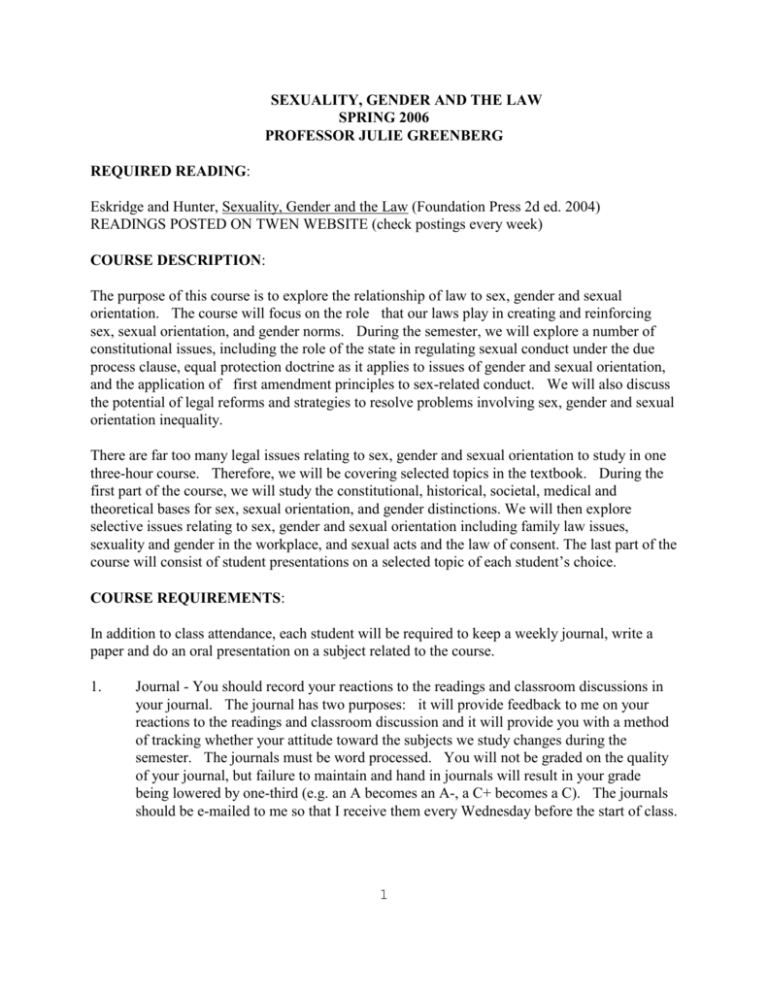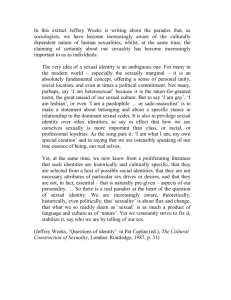
SEXUALITY, GENDER AND THE LAW
SPRING 2006
PROFESSOR JULIE GREENBERG
REQUIRED READING:
Eskridge and Hunter, Sexuality, Gender and the Law (Foundation Press 2d ed. 2004)
READINGS POSTED ON TWEN WEBSITE (check postings every week)
COURSE DESCRIPTION:
The purpose of this course is to explore the relationship of law to sex, gender and sexual
orientation. The course will focus on the role that our laws play in creating and reinforcing
sex, sexual orientation, and gender norms. During the semester, we will explore a number of
constitutional issues, including the role of the state in regulating sexual conduct under the due
process clause, equal protection doctrine as it applies to issues of gender and sexual orientation,
and the application of first amendment principles to sex-related conduct. We will also discuss
the potential of legal reforms and strategies to resolve problems involving sex, gender and sexual
orientation inequality.
There are far too many legal issues relating to sex, gender and sexual orientation to study in one
three-hour course. Therefore, we will be covering selected topics in the textbook. During the
first part of the course, we will study the constitutional, historical, societal, medical and
theoretical bases for sex, sexual orientation, and gender distinctions. We will then explore
selective issues relating to sex, gender and sexual orientation including family law issues,
sexuality and gender in the workplace, and sexual acts and the law of consent. The last part of the
course will consist of student presentations on a selected topic of each student’s choice.
COURSE REQUIREMENTS:
In addition to class attendance, each student will be required to keep a weekly journal, write a
paper and do an oral presentation on a subject related to the course.
1.
Journal - You should record your reactions to the readings and classroom discussions in
your journal. The journal has two purposes: it will provide feedback to me on your
reactions to the readings and classroom discussion and it will provide you with a method
of tracking whether your attitude toward the subjects we study changes during the
semester. The journals must be word processed. You will not be graded on the quality
of your journal, but failure to maintain and hand in journals will result in your grade
being lowered by one-third (e.g. an A becomes an A-, a C+ becomes a C). The journals
should be e-mailed to me so that I receive them every Wednesday before the start of class.
1
2.
Paper - The paper can be on any subject that you choose related to sex, gender or sexual
orientation. The paper should not be a report; it must provide a legal analysis of your
selected topic. The paper must incorporate the constitutional and theoretical material we
have learned in class and apply it to an area of law. You must choose a topic by the
second week of class, but I recommend that you review the Table of Contents to your
textbook before classes begin and start thinking about the subjects that interest you. I
have attached a list of suggested topics. If you choose a topic not on this list, you must
get it approved. The paper should be at least 20 pages in length excluding footnotes.
3.
Oral presentation - Each of you will prepare a presentation for the class based on the topic
you choose for your paper. You are responsible for choosing background reading
material for the class. The background reading material must be provided to the students
in the class at least one week before your presentation. You can either use the TWEN
page to email or post the readings or bring copies to class to hand out. The oral
presentation will count as 15% of your final grade.
GRADES:
The course is graded. Your grade will be based on the following factors.
Research plan
Outline to paper
Paper
Oral Presentation
Rewrite of Paper
5%+
20%+
40%*
15%
20%
100%
*The grade you receive on your paper will be based upon the quality of your analysis and the
quality of your writing. Approximately 80% of the grade will be based on your substantive
analysis and approximately 20% of the grade will be based on the quality of the writing.
+If
your research plan or outline do not meet the minimum requirements, you will be required to
rewrite the research plan or outline before the date the next assignment is due. Failure to rewrite
and meet minimum standards for the research plan before the date the outline is due will result in
the outline being considered late. Failure to rewrite and meet minimum standards on the outline
before the date the paper is due will result in the paper being considered late.
IMPORTANT DATES (All assignments are due at the start of class)
1/18
2/1
2/22
3/22
Paper Topic Chosen and Approved
Research plan due
Outline of paper due
Paper due
2
4/5
4/24
Graded paper returned to students
Rewrite of paper due (5:00 p.m.)
NONANONYMOUS GRADING:
This course is not graded anonymously. You will be placing your name on all graded
assignments.
LATE PAPER POLICY:
To receive full credit for assignments, they must be handed in on time. Lateness will result in a
significant deduction for each day or part of a day that your assignment is late. Lateness will be
excused only in rare situations and only upon submission of a written request for extension and
provision of adequate proof supporting the necessity for the extension.
PLAGIARISM:
Plagiarism is a violation of the ethical standards of Thomas Jefferson School of Law. According
to Webster's Ninth New Collegiate Dictionary, plagiarism is (1) "to steal and pass off (the ideas
or words of another) as one's own" or (2) to "use (a created production) without crediting the
source." All written assignments in this class must be the product of your own research,
analysis, writing, and editing. You must not steal and pass off as your own the work of any
other person. You will, of course, use cases and statutes as authority for your analysis. You
must credit those sources.
APPOINTMENTS:
If you have a question or comment that would be of interest to the entire class, please post it to
the TWEN website for the course. If you want to have a private conversation and you do not
need to see me for a lengthy meeting, stop by my office, call me at ext. 6931, or email me at
julieg@tjsl.edu. If you would like a longer meeting, please email me with suggested meeting
times.
3
SUGGESTED TOPICS
Your research paper should describe a particular area of law and analyze that body of law
using the constitutional and theoretical material we discuss in the course. You may write
on any subject related to sex, gender and sexual orientation, but you must get approval of
the topic if it is not on the following list. The list is by no means exhaustive, so feel free to
be creative in developing a topic.
Contraception
Abortion
Sexual Practices
Sex Discrimination
Sexual Orientation Discrimination
Gender Identity Discrimination
Binary Sex, Gender and Sexual Orientation
Categories
Medicalization of American Law
Intersections of Sex and Race
The Military and Sexual Orientation
Discrimination
The Military and Gender Discrimination
Exclusion of Women from Combat
Sexual Outing
Hate Speech
Pornography
State Limitations on Sexual Speech
Education and Expressions of Sexuality
Academic Freedom and Issues of Gender and
Sexuality
Title IX and Sex Discrimination
Same Sex Schools
AIDS Education
Sex Education
Sex and Religion
Anti-gay Initiatives
Sex Toys
Sex Offenders and the Penal System
Publication of the Identities of Sex Offenders
Sex in the Media
Feminist Theory
Queer Theory
International Norms of Sexuality and Gender
Immigration and Sexual Orientation or
Gender Discrimination
Female Genital Surgery
Surrogacy
Assisted Reproductive Technologies
Nonmarital Relationships
Same-sex Marriage
Incest
Polygamy and Polyandry
Sexual Orientation and Custody or Adoption
Sexuality and Children
AIDS Discrimination
State legislation banning discrimination based
on Sex, Sexual Orientation or Sexual Identity
Rape
Disclosing Identity of Rape Victims
Sadomasochism
Prostitution
Hate Crimes
The Conflation of Sexuality and Disease
Criminal and Civil Liability for Sexually
Transmitted Diseases
Cross Dressing
Lawyer/Client Sexual Relations
Sex in the Penal System
Gender and the Penal System
Transsexualism and the Penal System
Intersexuality
Gender Assignment
Women and the penal system (birth control
and parenting issues)
Obscenity
Coming out Speech
Defamation and sex/sexual orientation
related speech
4
SEXUALITY, GENDER AND THE LAW--SPRING 2006
Professor Julie Greenberg
WEEK
DATE
SUBJECT
READING
1
1/11
PART I: INTRODUCTION TO
DOCTRINAL, HISTORICAL AND
THEORETICAL ISSUES
v-viii;
xlix-lxiv
The Constitution and Sexuality: The Right to
Sexual Privacy–Substantive Due Process
–Contraception
1-2
3-30
2
1/18
The Constitution and Sexuality: The Right to
Sexual Privacy–Substantive Due Process
–Sodomy, Sex Toys and Other Private
Consensual Acts
3
1/25
WEEK
DATE
Paper topic
chosen and
approved
44-100
Due Process
Class Exercise
The Constitution and Sexuality: Equality
Challenges to State Discrimination
–Introduction
–Sex Discrimination
–Sexual Orientation Discrimination
4
2/1
ASSIGNMENT
165-176
177-203
211-216
217-219; 227-249;
294-297
The Constitution and Sexuality: Equality
Challenges to State Discrimination
Research Plan
Due
–Sexual Orientation Discrimination
259-283
E.P. class exercise
–Sex Discrimination Harming Sexual Minorities
298-313; 316-320
SUBJECT
READING
5
ASSIGNMENT
5
2/8
6
2/15
7
2/22
8
3/1
no class on 2/8
Women and the Law Conference on 2/10
3:00-6:30 p.m.
Sexuality at Work
(mandatory
attendance)
THE MALE/FEMALE DICHOTOMY:
CHALLENGES TO CORE MEANINGS
1419-1422
1431-1432
209-210
1457-1462
1469-1478
Readings posted
on TWEN
To be determined based on student preference
and oral presentations
OUTLINE
DUE
To be determined based on student preference
and oral presentations
9
3/15
No class on 3/8: Spring Break
To be determined based on student preference
and oral presentations
Weeks
10-14
3/22
3/29
4/5
4/12
4/19
STUDENT PRESENTATIONS
PAPER DUE
(3/22)
GRADED
PAPER
RETURNED
(4/5)
REWRITE
DUE (4/24 at
5:00 p.m.)
6









